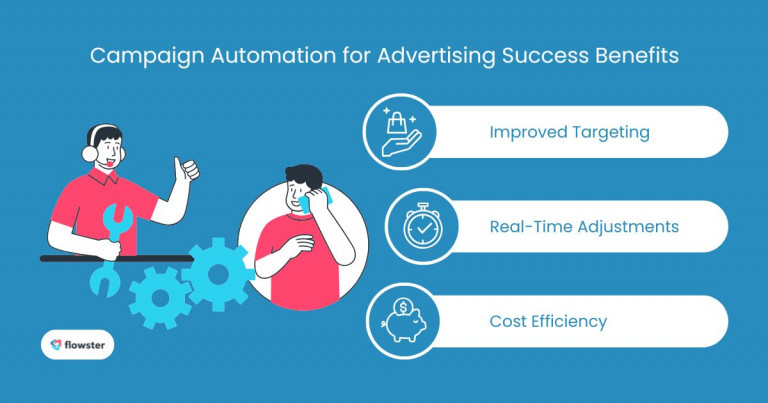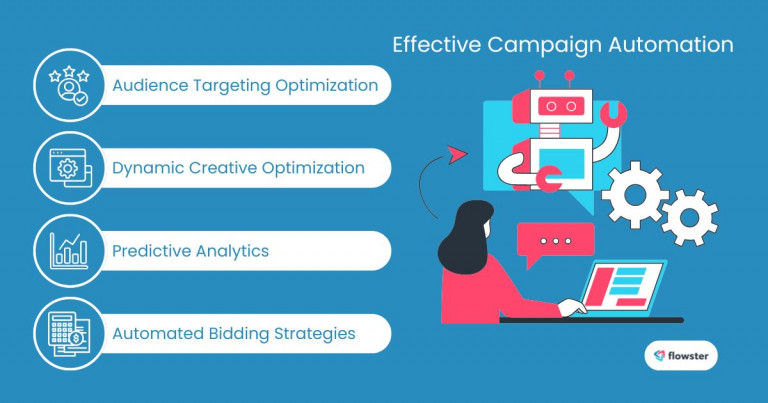In today’s fast-paced digital marketing landscape, efficiency and precision are paramount. Campaign automation has emerged as a transformative tool that empowers businesses to streamline their advertising efforts and achieve remarkable results. By automating repetitive tasks and optimizing campaign performance, businesses can significantly enhance their efficiency, precision, and overall return on investment (ROI).
This comprehensive guide will delve into the world of campaign automation, exploring its core concepts, benefits, strategies, and real-world applications. Whether you’re a seasoned marketer or just starting your journey, you’ll gain valuable insights to leverage this powerful technology.
Article Outline
What is Campaign Automation?
Campaign automation is a powerful technology that streamlines and optimizes digital marketing campaigns. By leveraging machine learning and data-driven insights, it automates repetitive tasks and makes intelligent decisions in real-time. This allows marketers to focus on strategic initiatives and achieve greater efficiency and effectiveness.
Key Functions of Campaign Automation:
- Targeting: Automated systems can identify and target the right audience segments based on various factors such as demographics, interests, and behaviors.
- Bidding: AI-powered algorithms optimize bids in real-time to maximize conversions and minimize costs.
- Content Delivery: The right content is delivered to the right audience at the right time, ensuring maximum impact.
- Real-time Adjustments: Campaign automation platforms can quickly adapt to changing market conditions and user behavior, ensuring optimal performance.
By automating these essential functions, campaign automation empowers marketers to achieve better results with less effort. In the next section, we’ll explore the compelling reasons why campaign automation is indispensable in today’s digital marketing landscape.
Why Campaign Automation is Essential in Digital Marketing
Campaign automation is no longer a luxury; it’s a necessity for businesses seeking to thrive in the digital age. By automating repetitive tasks and leveraging data-driven insights, marketers can unlock significant benefits.
Key Benefits of Campaign Automation:
- Increased Efficiency: Campaign automation frees up valuable time and resources by automating routine tasks such as bid adjustments, A/B testing, and report generation. Marketers can focus on strategic initiatives that drive growth and innovation.
- Enhanced Performance: AI-powered algorithms analyze vast amounts of data to identify optimal targeting criteria and bidding strategies. This precision leads to improved campaign performance and higher ROI.
- Scalability: As businesses grow, so do their marketing needs. Campaign automation enables marketers to handle multiple campaigns across various platforms without compromising quality or efficiency.
- Data-Driven Insights: Automation tools provide valuable insights into audience behavior, ad performance, and conversion rates. By analyzing this data, marketers can make informed decisions to optimize their campaigns and achieve better results.
In the next section, we’ll delve deeper into the specific benefits of campaign automation for advertising success.

Key Benefits of Campaign Automation for Advertising Success
Campaign automation offers a plethora of benefits that can significantly enhance your advertising efforts. Let’s explore some of the key advantages:
- Improved Targeting and Segmentation: With campaign automation, you can precisely target your ideal audience segments. By leveraging advanced targeting features, you can deliver personalized messages to individuals who are most likely to convert. This leads to higher engagement rates and improved ROI.
- Real-Time Adjustments: In today’s fast-paced digital landscape, agility is crucial. Campaign automation empowers you to make real-time adjustments to your campaigns based on changing user behavior and market conditions. By automatically adapting to these changes, you can optimize your campaigns for maximum impact.
- Cost Efficiency: Automated bidding strategies can help you optimize your ad spend and maximize your return on investment. By intelligently bidding on ad auctions, you can ensure that your budget is allocated to the most effective campaigns. This leads to significant cost savings and improved overall performance.
By harnessing the power of campaign automation, you can elevate your advertising efforts, achieve better results, and stay ahead of the competition. Let’s delve deeper into specific campaign automation strategies in the next section.
Capture Your Processes in Minutes!
Top Strategies for Effective Campaign Automation
To maximize the potential of campaign automation, implementing effective strategies is crucial. Let’s explore some of the top strategies:
- Audience Targeting Optimization: By leveraging audience data and insights, you can refine your targeting strategies. This involves identifying specific audience segments based on demographics, interests, and behaviors. By targeting the right audience with the right message, you can increase engagement and conversion rates.
- Dynamic Creative Optimization (DCO): DCO allows you to create personalized ad variations that resonate with specific audience segments. By dynamically adjusting elements like images, headlines, and calls to action, you can deliver highly relevant and compelling ad experiences.
- Cold Email Outreach: Integrate a focused cold email channel into your mix. Platforms like Mailgo act as a B2B lead finder, surfacing qualified contacts in seconds while automatically warming up your domain to boost cold email deliverability. From there, you can draft personal messages and schedule follow-ups in a single dashboard with no extra tools required.
- Predictive Analytics: Predictive analytics utilizes historical data to forecast future trends and behaviors. By analyzing past performance, you can anticipate audience actions and optimize your campaigns accordingly. This proactive approach can help you stay ahead of the curve and make data-driven decisions.
- Automated Bidding Strategies: Automated bidding strategies, such as target CPA and ROAS, can help you maximize your advertising budget. By setting specific performance goals, you can let the algorithm automatically adjust bids to achieve your desired results.
By implementing these strategies, you can unlock the full potential of campaign automation and drive significant improvements in your advertising performance. In the next section, we’ll explore real-world applications of campaign automation to inspire your own marketing initiatives.

Real-World Applications of Campaign Automation
Campaign automation has a wide range of applications across various industries. Let’s explore some real-world examples:
- Ecommerce: Ecommerce businesses can leverage campaign automation to deliver personalized shopping experiences. By analyzing customer browsing and purchase history, retailers can target specific products and promotions to individual shoppers. This personalized approach can increase customer engagement and drive sales.
- Travel and Hospitality: The travel and hospitality industry can benefit from campaign automation by delivering real-time offers and recommendations to potential customers. By analyzing factors such as destination preferences, travel dates, and budget, businesses can target the right audience with the right message at the right time. This can lead to increased bookings and revenue.
- Financial Services: Financial institutions can use campaign automation to target potential customers with relevant loan and credit products. By analyzing customer data, banks and credit unions can identify individuals who are likely to be interested in specific financial services. This targeted approach can improve lead generation and customer acquisition.
Case Study: Shofi Agency Success Using Flowster
The “Shofi Agency Case Study” video by Flowster offers a compelling look at how automation can transform ad campaign management. Through real-world examples, it demonstrates how agencies can use automation to boost efficiency, optimize targeting, and maximize ROI. Watch this video to discover actionable insights on streamlining ad campaigns and staying competitive in the fast-paced world of digital marketing.
As you can see, campaign automation has the potential to revolutionize the way businesses approach their marketing efforts. However, there are certain challenges that organizations may encounter when implementing campaign automation.
Challenges in Implementing Campaign Automation
While campaign automation offers numerous benefits, it’s important to acknowledge the challenges that may arise during implementation.
- Data Privacy and Security: As campaign automation relies on collecting and analyzing vast amounts of customer data, ensuring data privacy and security is paramount. Adhering to data protection regulations such as GDPR and CCPA is crucial to build trust with customers and avoid legal repercussions.
- Technology Investment: Implementing a robust campaign automation solution requires significant investment in advanced technologies and skilled professionals. Organizations need to allocate sufficient resources to acquire the necessary tools and train their teams to effectively utilize them.
- Balancing Automation with Human Oversight: While automation can streamline many tasks, it’s essential to maintain human oversight to ensure that campaigns align with overall brand strategy and messaging. A balance between automation and human intervention is key to achieving optimal results.
Despite these challenges, the future of campaign automation is bright, with exciting trends emerging on the horizon.
Future Trends in Campaign Automation
The future of campaign automation is brimming with exciting possibilities. As technology continues to evolve, we can expect to see several emerging trends shaping the industry.
- AI Advancements: Artificial intelligence is poised to revolutionize campaign automation. With advanced AI algorithms, marketers can expect even more sophisticated targeting, predictive analytics, and automated decision-making. This will enable hyper-personalized campaigns that deliver exceptional results.
- Increased Personalization: Personalization will continue to be a major focus in campaign automation. By leveraging data-driven insights, marketers can create highly tailored experiences for each individual customer. This will lead to stronger customer relationships and increased conversions.
- Cross-Platform Automation: As consumers interact with brands across multiple platforms, cross-platform automation will become increasingly important. By seamlessly coordinating campaigns across various channels, marketers can deliver consistent brand messaging and optimize their overall marketing efforts.
These advancements will further refine campaign strategies and performance, enabling businesses to stay ahead of the curve and achieve remarkable success.
Flowster's AI-Driven Automation
Embrace the Future: Start Automating Your Campaigns Today
Campaign automation has transformed the digital marketing landscape, empowering businesses to achieve remarkable results with greater efficiency and precision. By leveraging automation for repetitive tasks and data-driven insights, you can streamline your workflows, refine targeting strategies, and optimize campaign performance for significant ROI.
Don’t miss out on the potential of this revolutionary technology. Integrating campaign automation into your marketing strategy can significantly enhance customer engagement, boost conversions, and propel your business forward.
Ready to take the next step? Start exploring campaign automation tools and strategies to stay competitive in the ever-evolving digital advertising world. By embracing automation, you can unlock a wealth of opportunities to achieve optimal results.
Bonus: Free Digital Marketing Workflow Templates
Streamlining your marketing workflow is crucial for success. Utilizing free digital marketing templates can save you valuable time and ensure consistency across your campaigns. Flowster offers a free Standard Operating Procedure (SOP) Template specifically designed for marketing agencies:
This customizable template can help you document your marketing processes, improve team collaboration, and achieve operational excellence.
Embrace the power of automation and free resources to elevate your digital marketing efforts and achieve lasting success.




